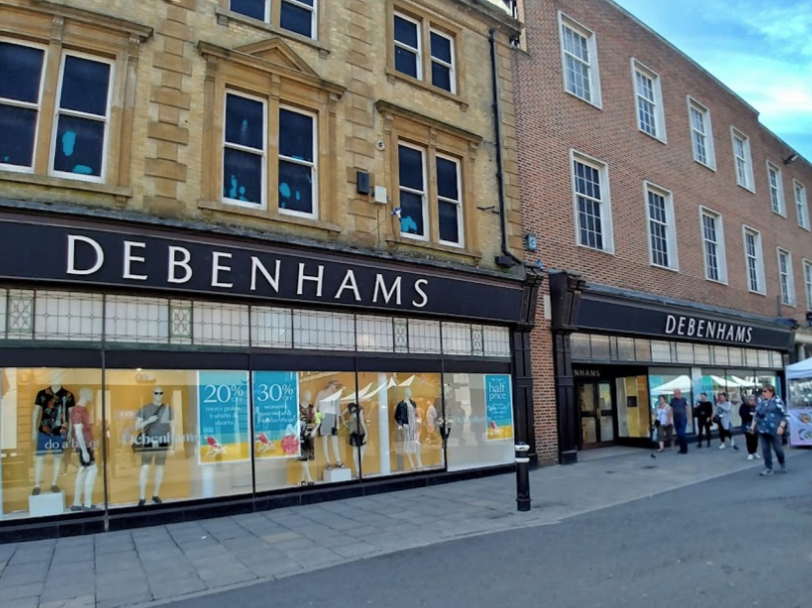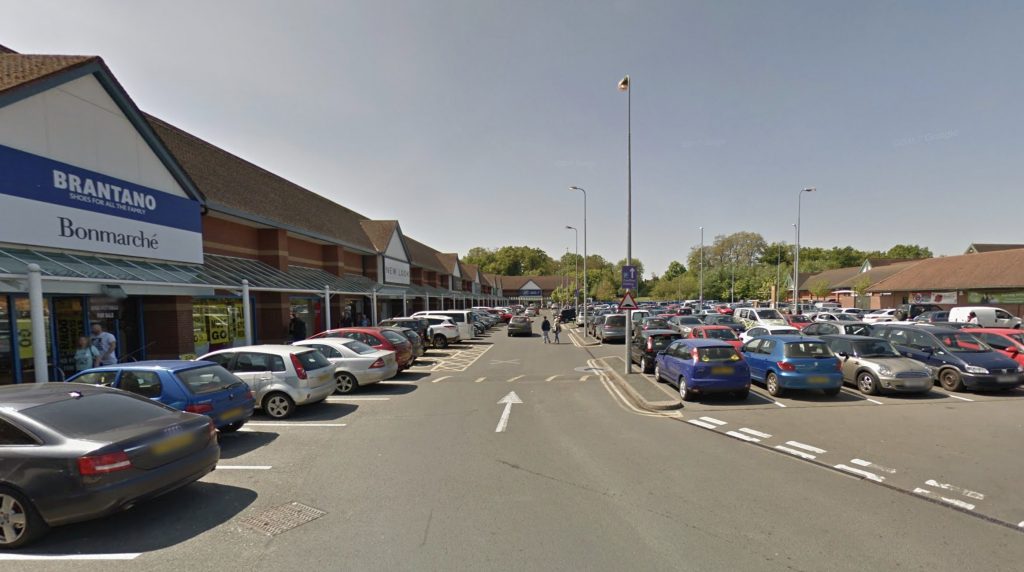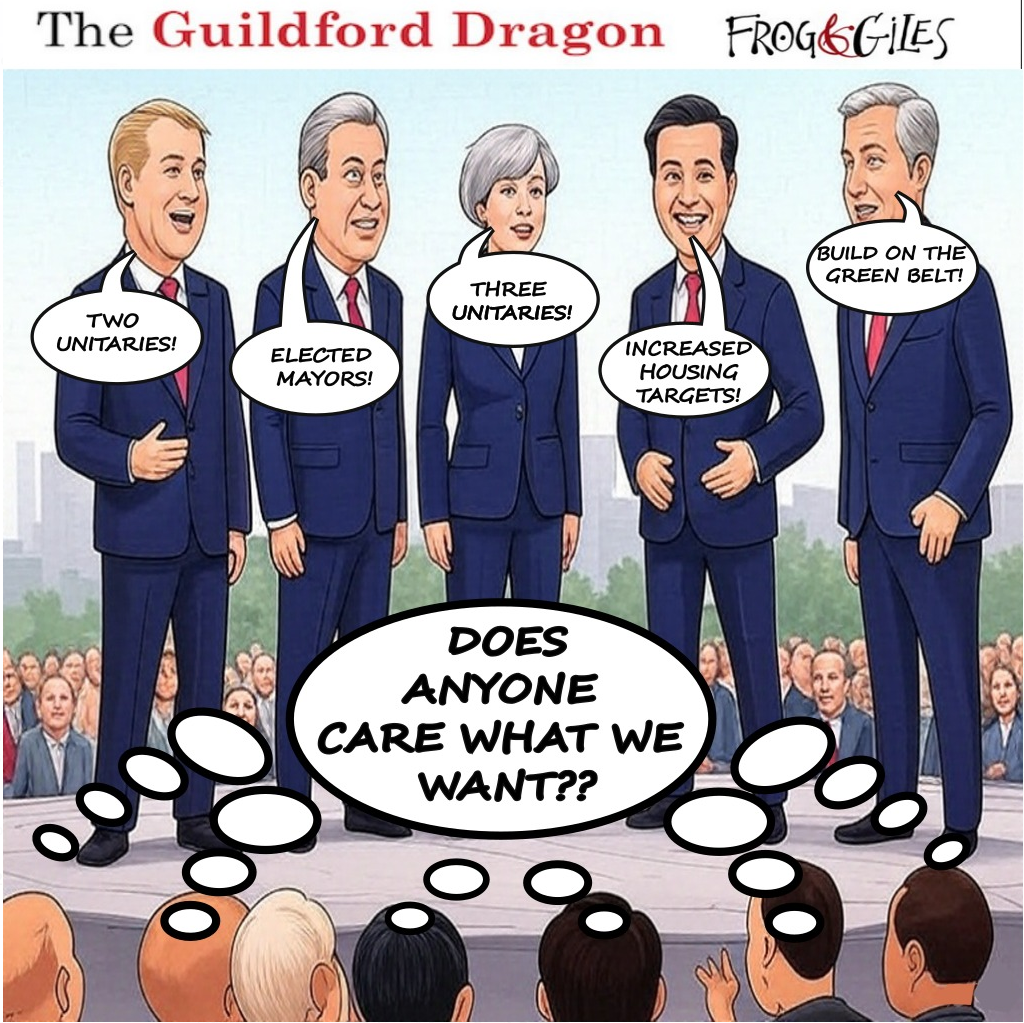 Abraham Lincoln
If given the truth, the people can be depended upon to meet any national crisis...
Abraham Lincoln
If given the truth, the people can be depended upon to meet any national crisis...
 Guildford news...
for Guildford people, brought to you by Guildford reporters - Guildford's own news service
Guildford news...
for Guildford people, brought to you by Guildford reporters - Guildford's own news service
SCC Changes Debt Repayment Strategy Labelled ‘Shockingly Blasé’ by Guildford Councillor
Published on: 27 Jan, 2022
Updated on: 30 Jan, 2022

Surrey County Council owns the, now empty, Winchester Debenhams building as part of its Halsey Garton portfolio. Google Street View
By Julie Armstrong
local democracy reporter
Surrey County Council is changing its strategy on debt repayment after auditors branded it “imprudent”.
The council hadn’t set aside money its budget to repay £233million worth of loans borrowed from the government for its commercial property investments around the country.
It was relying on selling off the property if it had to. But it came to light the council’s portfolio was last year worth almost a quarter under what it paid for it.
A Guildford Lib Dem county councillor has blasted the previous policy. George Potter the Lib dem SCC member for Guildford east said: “This shows how shockingly blasé Surrey Conservatives were about the hundreds of millions they put at risk through property investments.
“Any fool knows that investments may go down as well as up, yet they seemingly ignored this when they embarked on their irresponsible shopping spree.
“Essentially they took out a vast mortgage to buy property valued at £329 million. Rather than making contingency plans for paying back the mortgage, they decided that instead, if the bank ever came to collect on the debt, they’d just sell the property to pay them.
“But that property is now worth 25 per cent less than they paid for it, and the council is stuck in negative equity.
“Right now the portfolio is still providing a net income, but the situation is inherently unstable. If, as seems likely, rents don’t keep pace with inflation, or if interest rates rise, then ultimately it’s the taxpayer who’d be left paying the bill racked up by the Conservative administration.”
Mark Hak-Sanders, “strategic finance business partner (corporate)”, who has worked in his current role at SCC for nearly two years, said: “Our strategy for 2021 didn’t include any minimum revenue provision for those loans, so we weren’t setting aside any funds to repay that debt.
“The logic behind that was that if we were required to pay any debt as a county, we would be able to realise a capital receipt from the sale of those investment properties in order to deliver the cash we needed to repay the loan.”
Grant Thornton went it audited the policy said that, although it was in line with legislation, it was in their view “imprudent”.
Mr Hak-Sanders said: “I would say that that was with a significant degree of hindsight.
“We set the policy before Covid-19 had a knock-on effect on the investment property values, and effectively Grant Thornton were auditing that a year later with the benefit of another year’s reduction in those investment property values.
“Nevertheless we understood their point and we accepted that the policy could be more prudent.”
The county council is to change its policy so that from 2022/23 a minimum amount must be set aside each year from their revenue account on all loans, including those to its subsidiaries investing in property outside of the county.
The Government is considering making this a legal requirement from 2023.
The current year introduced a policy where it would do this only where a property’s market value was no longer sufficient to cover the outstanding loan, which Grant Thornton concluded was “no longer imprudent, but optimistic”.
Cllr David Lewis (Con, Cobham), chair of the council’s audit and governance committee, said: “I think, hopefully speaking on behalf of the committee, we welcome the change to the minimum revenue provision strategy. It’s good to see that that has now been adopted.”
At the end of March 2021, Surrey County Council’s Halsey Garton property portfolio was valued at £78million lower than cost.
Commercial properties owned by the council’s subsidiary Halsey Garton Property Ltd are now valued at £251.25million, a 24 per cent reduction.
The loss in value is said to be “largely due to pressures on the retail environment”, with the portfolio comprising 37 per cent retail.
The council will now set aside money each year so that it can afford to repay the debt associated with those investments, bringing its policy in line with Grant Thornton’s guidance.
Mr Hak-Sanders said: “We ought to look at the overall return not just the capital return – those properties, particularly the ones that are showing a reduction in their capital value, are still making a significant contribution to the revenue budget, and will continue to do so whilst we hold them.”
Anna D’Alessandro, finance director corporate and commercial, said the portfolio generates £8.5 million net income for the council each year and pointed out the loss was unrealised.
“The capital value only impacts us should we choose to sell the asset, and we have no plans to do so,” she said.
Mr Hak-Sanders added: “Those investments are held for long-term return and whilst there might be fluctuations in the value of that portfolio, there’s every expectation that it will recover over the medium-term.”
“Providing society returns to its previous patterns of behaviour,” said Cllr Lewis.
“But I think what we’re seeing as a result of the last two years is that life going forward is probably very different and that might have an impact in terms of demand for commercial and retail property.
“It seems to me we’re living in pretty uncertain times. We’ve got inflation which is rising fairly rapidly to sort of 30-year highs and we don’t know really where we are with the pandemic.”
A separate Halsey Garton portfolio of 72 residences made a loss of £30,000 last year.
Paul Forrester, strategic finance business partner (commercial), said this represented the company being in its start-up phase and only trading for eight months and the forecast was positive.
Asked what they thought to be the biggest risk to the council, Mr Hak-Sanders said interest rates.
The council’s £1.95 billion capital programme requires it to borrow £1.3 billion over the next five years.
Its level of borrowing as a proportion of what it spends is going up – from about two per cent this year to six per cent in 2026/7.
Mr Hak-Sanders said this is similar to the seven per cent for comparable local authorities, adding there is an interest rate reserve of £1.6million which could cover short-term rate increases.
Responses to SCC Changes Debt Repayment Strategy Labelled ‘Shockingly Blasé’ by Guildford Councillor
Leave a Comment Cancel reply
Please see our comments policy. All comments are moderated and may take time to appear. Full names, or at least initial and surname, must be given.Recent Articles
- Letter: Is This the Ugliest Building in Guildford?
- Pub Chain Wins High Court Battle Over Customer’s Injuries
- Forest Management Can Influence Health Benefits
- Dragon Interview: New Guildford Mayor Howard Smith
- Delaying the Net-Zero Transition Could Have Dire Consequences, Research Reveals
- County Council Leader Appeals to MPs Not to ‘Talk Down’ Children’s Services
- Guildford Plays Its Part in Campaign to Protect Bees
- A New Superdrug is Coming to Guildford’s Ladymead Retail Park
- Two Candidates Compete for Seat on Ash Parish Council
- MPs Unite in Criticism of SCC’s Handling of SEND Cases


Recent Comments
- J Howard on Stoke Mill To Be a Pub If Plans Are Approved by Borough Council
- Angela Richardson on Letter: Zero Carbon – Nothing But Hot Exhaust
- George Potter on Letter: Zero Carbon – Nothing But Hot Exhaust
- Sara Tokunaga on Letter: Zero Carbon – Nothing But Hot Exhaust
- S Collins on Stoke Mill To Be a Pub If Plans Are Approved by Borough Council
- George Potter on Letter: Zero Carbon – Nothing But Hot Exhaust
Search in Site
Media Gallery
Dragon Interview: Local Artist Leaves Her Mark At One of England’s Most Historic Buildings
January 21, 2023 / No Comment / Read MoreDragon Interview: Lib Dem Planning Chair: ‘Current Policy Doesn’t Work for Local People’
January 19, 2023 / No Comment / Read MoreA3 Tunnel in Guildford ‘Necessary’ for New Homes, Says Guildford’s MP
January 10, 2023 / No Comment / Read More‘Madness’ for London Road Scheme to Go Ahead Against ‘Huge Opposition’, Says SCC Leader
January 6, 2023 / No Comment / Read MoreCouncillor’s Son Starts Campaign for More Consultation on North Street Plan
December 30, 2022 / No Comment / Read MoreCounty Council Climbs Down Over London Road Works – Further ‘Engagement’ Period Announced
December 14, 2022 / No Comment / Read MoreDragon Interview: GBC Reaction to the Government’s Expected Decision to Relax Housing Targets
December 7, 2022 / No Comment / Read MoreHow Can Our Town Centre Businesses Recover? Watch the Shop Front Debate
May 18, 2020 / No Comment / Read More















Keith Francis
January 27, 2022 at 7:50 pm
Those property investments were supposed to generate more income for SCC than from council tax.
We must most carefully watch SCC’s actions as I believe that its leader is still wanting Surrey as a Unitary Authority. The first areas to be disbanded might be joint SCC Committees with local authority councillors.